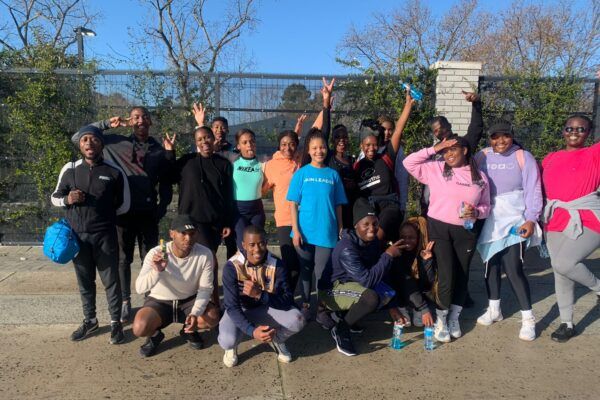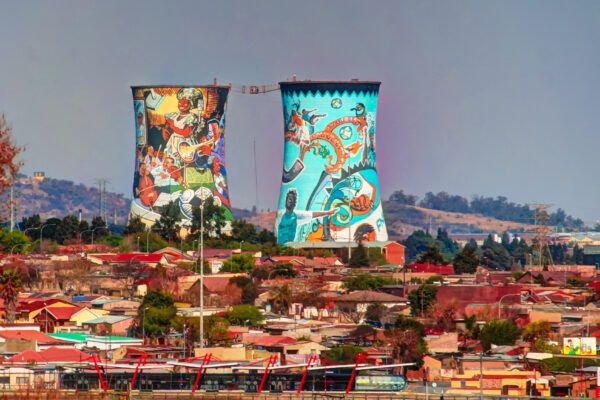UrbanBetter runners in Lagos, Nigeria
Tackling the impact of climate change on health will require a focus on cities, where over 50% of greenhouse gas emissions arise. Nowhere is this more important than in Africa, one of the fastest urbanising regions globally with multi-dimensional climate-sensitive precarities such as haphazard land use mix pose health threats.
Dynamic cities have a transformative role to play in accelerating progress towards the healthier, greener, safer, more inclusive and resilient future set out in the Sustainable Development Goals. But decision making in the public and private sectors that shapes these environments is not adequately focused on protecting health and preventing disease. This results in environments that simultaneously increase the burden of disease and climate vulnerability.
The use of participatory citizen science approaches to characterise health determinants has been documented in high-income countries and regions. And research has shown that an app could improve citizen science engagement beyond once-off engagements, with the potential for citizen science data to inform policymaking. But there is no sustained youth-led digital infrastructure to support participatory measurement of environmental risks to health and climate that could inform policy and activism in Africa’s rapidly urbanising countries.
Wearable tech can engage citizens, media and government
The UrbanBetter Cityzens for Clean Air initiative amplified youth voices with advocacy on air pollution, climate and health by using citizen scientist data generated by young people. The first phase of #Cityzens4CleanAir was implemented in Lagos, Nigeria, Accra, Ghana and Cape Town, South Africa. Between June and November 2022, we worked with young people to design running experiments in their cities. These 27 runners mobilised over 300 people to run with them while they measured the air quality using wearable sensors. Using a bespoke UrbanBetter Cityzens mobile application, these citizen scientists captured multimedia (photo, audio, video, text) geocoded data on aspects of the built environment that influence health and sources of polluted or clean air encountered during the run.
The data were integrated on the Cityzens interactive data platform of the lived environments encountered while running. The data also informed the policy prescriptions the citizen scientists developed and shared locally with the government, media and globally through an exhibition and talks at COP27 in Egypt.
Overall we found that wearables are an effective tool and a strong driver of engagement with the issue of air quality:
- Citizen scientist ‘Run Leaders’ used the wearables to raise awareness and gather localised insight.Integrating air quality readings with citizen-generated images, video, and voice notes on the data platform helped campaigners join the dots between what they were witnessing on the ground and the air quality data that were gathering.
- Co-runners who joined the runs expressed interest in acquiring the wearable AQ devices and using them to track air quality during their own daily runs; with some taking the initiative to run their own campaigns e.g. at local primary schools.
- City authorities expressed interest in the data generated including how this could complement static measurements. Representatives were willing to engage the run leaders in discussions about the findings, including notably the Mayor of Cape Town joining one of the runs.
Lessons for a successful campaign
Wearable technology usage needs to be relevant to local weather, data and technology contexts. For example, can the sensor type function in rainy and humid conditions? Does it have offline functionality for low data settings? Does it allow connection to older smart phones?
Recruiting engaged and diverse citizens was vital to the programme’s success. Citizen scientists had to proactively apply with a motivation expressing passion about climate or health justice. The Run leaders were then purposively selected to maximise demographic, geographic and sectoral diversity to ensure the co-designed campaign was as representative of each city’s tapestry of people and places as possible.
The campaign was designed to enable citizen scientists to use the data stories they generated to create localised advocacy messages and slogans. This made the content more relevant and shareable. The posters that featured local languages and scenes performed well online in terms of likes, comments, and shares.
Scaling impact
To achieve significant impact, this approach would need to be scaled across Africa and globally. Africa has the largest cohort of young people in history, with 60% of the population under the age of 25. The perspectives of young people are critical for effective and relevant urban solutions, but many are not involved in urban decision making and feel increasingly disenfranchised.
What if citizen science was viewed as a form of civic engagement and participatory democracy? By contributing to generating data that raises awareness and shapes urban decision making for health, it could be argued that this could/should be the case. These efforts would need to be considerably scaled, ensuring equitable opportunity for youth to participate irrespective of gender or socioeconomic position. While volunteerism is an important component of civic participation, it is critical to also recognise the contributions of citizen scientists as part of urban decision-making. One approach to institutionalising citizen science for action on air pollution could be to create Ctiyzens for Clean Air youth internships as part of national youth service/community service initiatives providing stipends to enable equitable participation.
This is the vision for the Cityzens for Clean Air, to scale an Africa-led global evidence-informed advocacy campaign that drives increased levels of government and media interest on air pollution across cities worldwide. The use of running advocacy is a reminder of the importance to health of physical activity.

